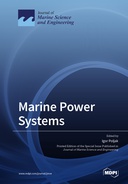Explore

Marine power systems have been designed to be a safer alternative to stationary plants in order to adhere to the regulations of classification societies. Marine steam boilers recently achieved 10 MPa pressure, in comparison to stationary plants, where a typical boiler pressure of 17 MPa was the standard for years. The latest land-based, ultra-supercritical steam boilers reach 25 MPa pressure and 620 °C temperatures, which increases plant efficiency and reduces fuel consumption. There is little chance that such a plant concept could be applied to ships. The reliability of marine power systems has to be higher due to the lack of available spare parts and services that are available for shore power systems. Some systems are still very expensive and are not able to be widely utilized for commercial merchant fleets such as COGAS, mainly due to the high cost of gas turbines. Submarine vehicles are also part of marine power systems, which have to be reliable and accurate in their operation due to their distant control centers. Materials that are used in marine environments are prone to faster corrosive wear, so special care also should be taken in this regard. The main aim of this Special Issue is to discuss the options and possibilities of utilizing energy in a more economical way, taking into account the reliability of such a system in operation.
This book is included in DOAB.
Why read this book? Have your say.
You must be logged in to comment.
Rights Information
Are you the author or publisher of this work? If so, you can claim it as yours by registering as an Unglue.it rights holder.Downloads
This work has been downloaded 170 times via unglue.it ebook links.
- 170 - pdf (CC BY) at Unglue.it.
Keywords
- absorption cooling
- atmospheric drain tank
- CODLAG
- cogeneration
- combined cycle
- data-driven modelling
- decay state coefficients
- diesel engine turbocharger
- energy analysis
- exergy analysis
- exergy destruction
- exergy efficiency
- failure diagnosis
- fault tree analysis
- flexible foundation
- fuel consumption
- genetic programming
- heating and cooling output
- History of engineering & technology
- hydraulic jet
- Isolation
- jet parameter
- LNG tanker
- Maintenance
- marine diesel engine
- marine propulsion
- marine steam turbine
- mechanical failure
- MLP neural network
- n/a
- NOx emissions
- operation efficiency
- optimization
- propulsion failure
- propulsion failure analysis
- propulsion main engine
- Reliability
- split injection
- submarine cable
- Technology, engineering, agriculture
- Technology: general issues
- trigeneration energy system
- turbine cylinders
- underwater vehicle
- vibration mitigation
Links
DOI: 10.3390/books978-3-0365-3151-9Editions

